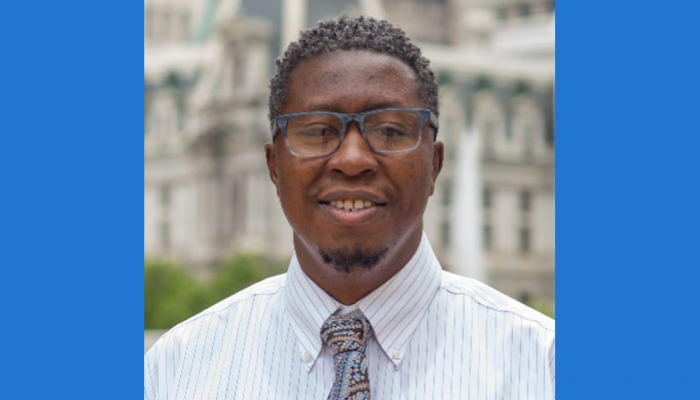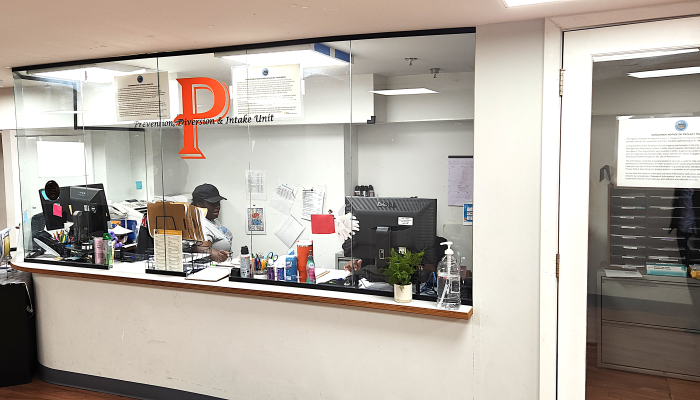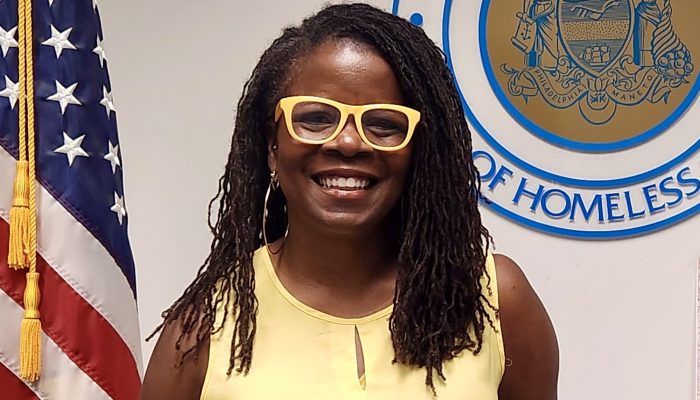David Holloman’s career has taken some twists and turns, but one thing has remained constant: his desire to advocate. Following a brief role in pharmaceuticals, Holloman found his stride as a case manager at the Mental Health Association. It was there that he fell in love with social services work.
“I’ve always been a people person, and this was my first opportunity to advocate for people who needed help,” said Holloman. “I consider myself to be a servant, and it’s a role I gladly take on. I’m very aware that the people I help – and the challenges they’re facing – that could have been me. It could be any one of us.”
Holloman, born into poverty in South Carolina, moved to Philadelphia at the age of five. His family struggled financially, and then some members with addiction. He credits his lived experience with allowing him to listen without judgment and truly get to know the people he is serving. That quality has served him through his positions with Resources for Human Development (RHD), Department of Behavioral Health and Intellectual disAbility Services (DBHIDS), and most recently at OHS – all that have allowed him to interact directly with clients from all walks of life.
“We’re all dealing with issues. In many ways, we are all one traumatic event away from crisis,” said Holloman. “The real difference is whether we have a support system in place. One of my favorite things about working with OHS is going out with the Street Team and making people understand that there’s more. There are answers out there. Real solutions.”
Prior to Mayor Jim Kenney’s appointing him Interim Executive Director of OHS in October, Holloman served as OHS Chief of Staff. In that role, he led the execution of smooth internal operations, informing key managers of day-to-day operational, tactical, and strategic issues within the agency. He also collaborated in developing and implementing new initiatives, business processes, procedures, roles, and operational improvement initiatives. During the COVID pandemic he helped develop new, innovative programs to support the most vulnerable individuals, including the elderly, those with chronic medical conditions, and young people. He currently serves as lead for the OHS Youth Homeless Demonstration Program (YHDP), aimed at reducing the number of homeless youth. Previously, Holloman served as OHS Director of External Affairs, building relationships and cultivating the best network of partners to help homeless services succeed.
“I’m always going to be inclusive, and I’m always going to place OHS in the role of a collaborator,” said Holloman. “Let’s have everyone come to the table to really get to the bottom of this. And let’s think about who has yet to be invited to the table, because we all have contributions to make. Homelessness is complex – there’s no one reason that an individual or family becomes homeless.”
In addition to financial challenges, Holloman cites domestic violence, opioid use, and health issues as traditional paths to poverty and homelessness. However, part of his job as he sees it is to educate people and challenge long-held perceptions about homelessness and people experiencing it.
“Since 2008, there is a different face as it relates to homelessness – one that usually goes unseen. And those are families,” said Holloman. “A recession across the nation led to significant job loss, and those families just haven’t recovered. Then the COVID-19 pandemic made it worse.”
As family homelessness remains elevated, Holloman has made it a priority to focus on family stabilization. In order to stabilize families, however, he believes the homeless services community needs to look beyond housing.
“My passion is around families and youth, not only because of my personal background, but because, once you stabilize a family, you can begin to stabilize communities,” said Holloman. “Truly stabilizing a family is more than housing. If you’re feeling the economic impact of job loss, we should be getting you a job. If you’re a young adult who has been derailed by homelessness, we need to get you opportunities for education and job training.”
Holloman believes seniors, whom he refers to as the “matriarchs of our communities,” also deserve an equal opportunity at housing. He believes a focus on families, youth, and seniors will – and must – reshape how we think about the risk unhoused populations face and the safety nets they need as a result.
“Public safety – an issue that is front and center in a city wrought with gun violence, as well as a nation that has faced civil and racial unrest since the murder of George Floyd – demands that we keep law enforcement and safety officials part of the conversation when it comes to homelessness,” said Holloman. “Climate change is a reality, and it forces us to take a look at the facilities we’re opening up. Can we accommodate people with certain needs? Who can we engage to ensure that we’re keeping people safe in extreme weather conditions?”
Despite all of these considerations, Holloman is confident in Philadelphia’s future because he’s seen what the homeless services community can do. That includes, in large part, the staff right here at OHS.
“Over the years, we have seen a significant reduction of unhoused people. There’s a lot more to be done, but we have some of the most phenomenal staff here. We have all been brought together by our compassion and burning desire to want to help others,” said Holloman. “Our model has been studied by other cities and regions, and implemented to great success. But it’s the people here in this office that make the difference for Philadelphia. I wouldn’t be where I am without their guidance, and I know that, together, there’s nothing we can’t do.”
David Holloman, who was appointed Interim Executive Director of OHS in October, has served for more than 15 years working with individuals experiencing homelessness in Philadelphia, including supporting outreach teams and building partnerships between various City departments and private entities to address chronic homelessness. He earned a BA in Public Administration from Shippensburg University and a Master of Science in Organizational Development Leadership from the Philadelphia College of Osteopathic Medicine.




